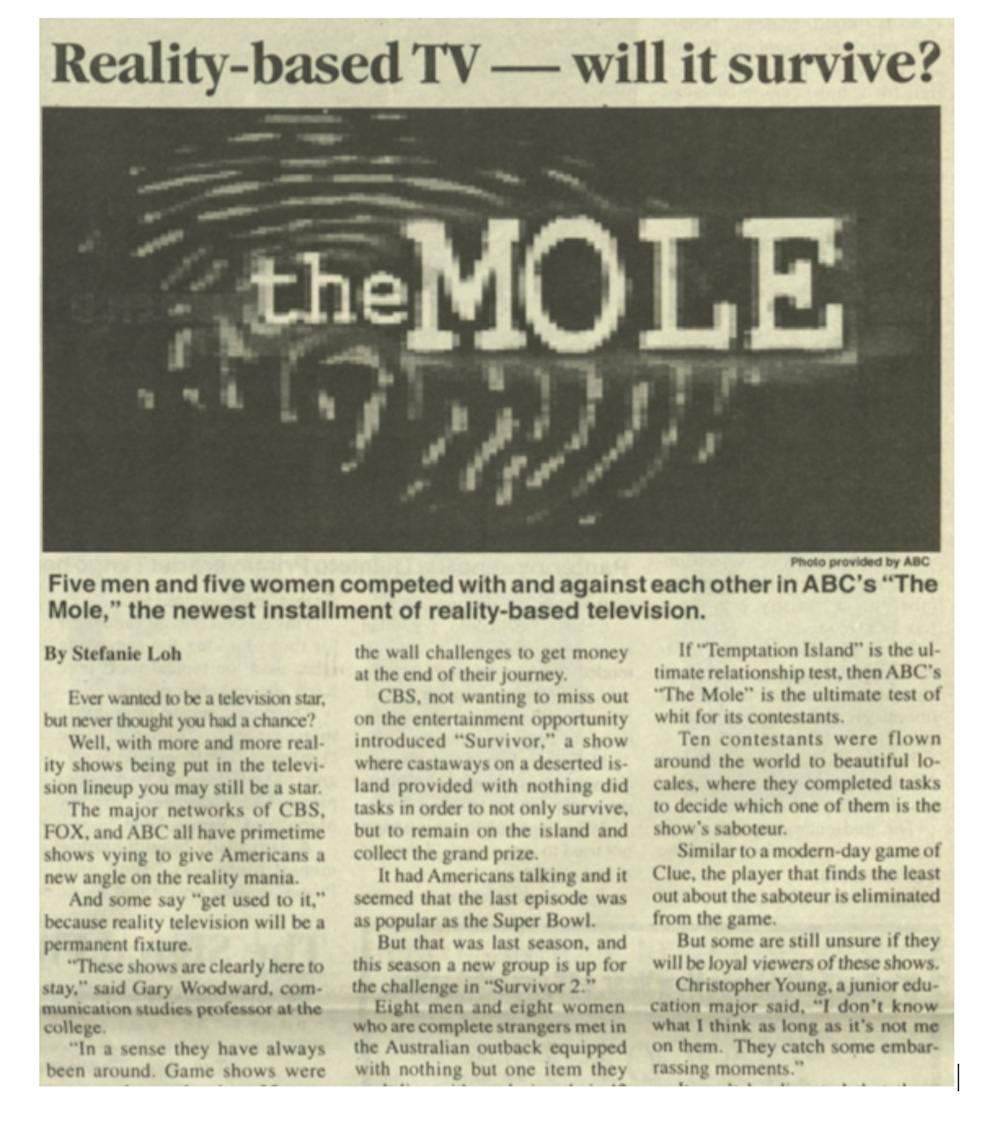By Liya Davidov
Features Editor
Between the rising popularity of Netflix, Hulu and DisneyPlus, do students even watch television anymore? Even though the College provides access to cable through Philo Edu, students may not necessarily need it. Every online platform offers a range of movies and shows for its viewers, from comedy to drama to romance.
In a January 2001 issue of The Signal, staff writer Stephanie Loh reviewed reality TV and questioned whether its popularity would last. A little less than two decades later, it is safe to say that this genre is here to stay.

Ever wanted to be a television star, but never thought you had a chance?
Well, with more and more reality shows being put in the television lineup you may still be a star.
The major networks of CBS, FOX, and ABC all have primetime shows vying to give Americans a new angle on the reality mania.
And some say "get used to it," because reality television will be a permanent fixture.
"These shows are clearly here to stay," said Gary Woodward, communication studies professor at the college.
"In a sense they have always been around. Game shows were enormously popular about 35 years ago, as were shows featuring odd accomplishments," he added.
While these shows may have always been around, they now spread like wildfire.
Krystyne Kendrick, a junior deaf and hard of hearing education ma jor said, "It seems like everyone is jumping on the reality television bandwagon."
If there was a bandwagon, it all started with MTV's "Real World," the show that MTV called the "true story of seven strangers picked to live in a house to see what happens when people start getting real."
The "Real World'' took its viewers across the country to locations such as New York, Miami, San Francisco, and even Hawaii.
Based on the popularity of the show, MTV expanded to include another show, "Road Rules," which had contestants do a variety of off the wall challenges to get money at the end of their journey.
CBS, not wanting to miss out on the entertainment opportunity introduced "Survivor," a show where castaways on a deserted island provided with nothing did tasks in order to not only survive, but to remain on the island and collect the grand prize.
It had Americans talking and it seemed that the last episode was as popular as the Super Bowl.
But that was last season, and this season a new group is up for the challenge in "Survivor 2."
Eight men and eight women who are complete strangers met in the Australian outback equipped with nothing but one item they can't live without during their 42 day stay.
They were split into the Kucha and Ogakor Tribes who met every third night in secret ballot to cast the least productive tribe member off the show.
The member left at the end inherits the prize.
Not to be forgotten though, is FOX's "Temptation Island," which features four unmarried couples in relationship turmoil on an island in the Caribbean.
The couples were separated and sent to opposite sides of the island for two weeks where each mate spent time with members of the opposite sex.
The couples could elect to see videotapes of each other with the opposite sex inhabitants.
FOX called it, "The ultimate test to see, 'Have I found the one, or is there someone better out there?"'
If "Temptation Island" is the ultimate relationship test, then ABC's "The Mole'' is the ultimate test of whit for its contestants.
Ten contestants were flown around the world to beautiful lo cales, where they completed tasks to decide which one of them is the show's saboteur.
Similar to a modern-day game of Clue, the player that finds the least out about the saboteur is eliminated from the game.
But some are still unsure if they will be loyal viewers of these shows.
Christopher Young, a junior education major said, "I don't know what I think as long as it's not me on them. They catch some embarrassing moments."
It can't be disputed that these shows clearly placed people out of their usual routines.
"Survivor 2" previewed people eating live larvae.
"Temptation Island" had committed people cheating on each other.
"The Mole" promised to emphasize the unintelligence of those who can't figure out the fundamental question, "Who dun it?"
So what made the majority of Americans so drawn to reality based programs?
"Most use a strong narrative of villains, heroes, and fools to draw us in. The melodramas sometimes uncover a legitimate injustice," said Woodward.
"But in other cases they offer the television equivalent of cheap thrills — stories we want to know, more than we need to know," he said.







